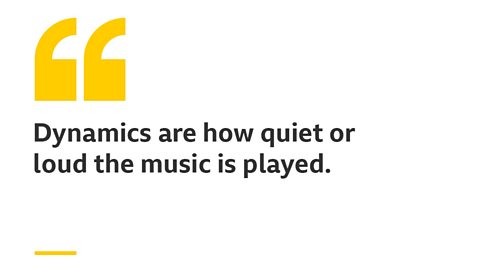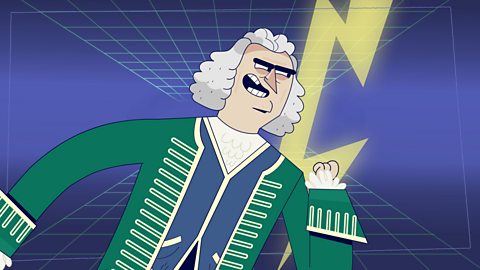Boy 1: We've been playing the same music over and over again.
Girl 1: Yeah. I'm starting to feel like a robot.
Boy 2: But we're playing everything so perfectly. Why is it so… meh?
Girl 2: Come on Hasan, we've got to make this better. We need to end this year with a BANG!
Tchaikovsky: A BANG?
Girl 2: Yeah, a bang! A boom! A blast!
Tchaikovsky: HA HA! What you need are…
DYNAMICS!
Boy 1: Tchaikovsky?
Tchaikovsky: In the flesh! Let's go out with a BING BANG BING BANG BOOM!
Girl 1: Awesome!
Boy 1: Wh…Where are we?
Tchaikovsky: Pardon? I can't hear you over these DEAFENING DYNAMICS!
Boy 2: Aah, dynamics, that's to do with how loud or quiet the music is.
Tchaikovsky: Da! Lots of musicians use dynamics to make their music more dramatic!
Changing the dynamics makes the listener feel different things.
Girl 3: A good one for that is Blur's Song 2 which starts off really quiet.
Tchaikovsky: Which is called…
'piano'…
Girl 1: And then it gets really loud!
Tchaikovsky: FORTE!
Ha ha! Tune!
But if we like, the music can get quieter and quieter gradually. This is called 'diminuendo'.
Or it can get gradually louder, like in my old masterpiece, we go from VERY QUIET…
Boy 2: That's pianissimo…right?
Boy 1: Ahh, that's nice.
Tchaikovsky: Then get louder and louder. That's called a CRESCENDO!
All the way up to my favourite…FORTISSIMO!
Boy 1: Uh oh! Ahh!
Girl 2: Alright guys. Dynamics. Let's do this!
Boy 1: Okay, start off nice and quiet. Pianissimo.
Girl 3: Now let's get louder and louder.
Girl 1: Into an epically crazy crescendo!
Boy 2: Fortissimo baby! Yeah!
Tchaikovsky: My work here is done.
Tchaikovsky is offsky.

What you need are dynamics!
Dynamics can make the listener feel different emotions. Musicians will change whether they play a part quietly or loudly depending on how they want the listener to feel.
On a musical score you might see Italian or German words used to describe dynamics:
Pianissimo means 'very quiet'.
Forte means 'loud'.
Crescendo means 'getting gradually louder'.

Watch Russian Dance from The Nutcracker by Tchaikovsky.
Pytor Ilyich Tchaikovsky wrote some of the most famous pieces of music of all time. This performance is taken from Ten Pieces III.
Activities

BBC Bitesize newsletter. External LinkBBC Bitesize newsletter
Sign up to our BBC Bitesize newsletter to receive monthly news, stories and updates on latest Bitesize content.

More on Music
Find out more by working through a topic
- count15 of 20

- count16 of 20

- count17 of 20

- count18 of 20
